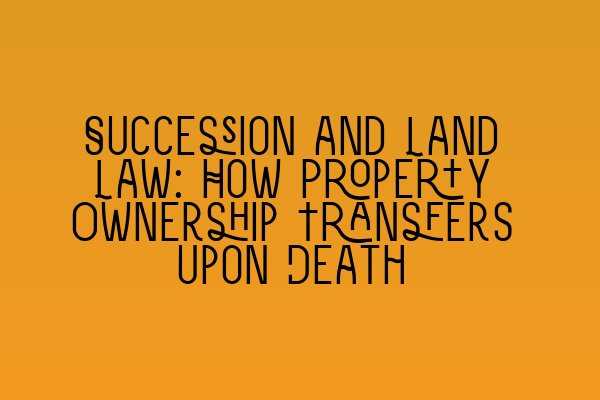Succession and Land Law: How Property Ownership Transfers Upon Death
When it comes to property ownership, one important aspect that needs to be considered is what happens to the ownership of the property upon the death of the owner. This is where the area of law known as succession and land law comes into play. In this blog post, we will explore the process of property ownership transfer upon death and the legal considerations that need to be made.
Before diving into the details, it’s worth mentioning that succession and land law can be complex and vary depending on the jurisdiction. Therefore, it is always advisable to consult with a qualified solicitor who specializes in property law to ensure the best course of action for your specific situation.
The process of property ownership transfer upon death involves the transfer of title from the deceased owner to another person, typically an heir or beneficiary. This transfer can be achieved through various legal mechanisms such as a will, intestacy laws, or trust arrangements.
In many cases, the property ownership transfer is governed by the deceased’s will. A will is a legal document that sets out the deceased’s wishes regarding the distribution of their assets, including property. It is crucial for the deceased to have a valid and up-to-date will in place to ensure that their property is transferred according to their wishes.
If the deceased did not leave a valid will, the property ownership transfer will be governed by the laws of intestacy. These laws outline the distribution of assets when there is no will. Generally, the spouse or civil partner, followed by children, parents, and other close relatives, are entitled to inherit the property. The specific rules of intestacy may vary depending on the jurisdiction, so it’s vital to seek legal advice to understand how these laws apply to your situation.
In some cases, property ownership transfer can be achieved through the use of trusts. A trust is a legal arrangement where the property is held by one party (the trustee) for the benefit of another (the beneficiary). Trust arrangements can be particularly useful for individuals who wish to ensure that their property is managed and distributed in a specific way after their death. Consulting a solicitor experienced in trust law is essential to establish a trust that meets your specific needs and objectives.
One crucial aspect of property ownership transfer upon death is the issue of inheritance tax. Inheritance tax is a tax imposed on the estate (including property) of a deceased person. The amount of tax payable and the exemptions available vary depending on the jurisdiction and the value of the estate. It is crucial to consider inheritance tax implications when planning your estate to potentially minimize tax liability. Seeking expert advice from a solicitor specializing in inheritance tax planning can help you navigate through this complex area of law.
In conclusion, property ownership transfer upon death is a critical aspect of succession and land law. The method by which ownership is transferred depends on various factors, including the presence of a will, laws of intestacy, or trust arrangements. It is crucial to seek legal advice from a solicitor specializing in property law to ensure that the transfer of property is handled correctly and in accordance with your wishes. Additionally, considering the potential impact of inheritance tax is essential in estate planning. By understanding the legal considerations and seeking expert advice, you can navigate through this area of law with confidence.
If you found this article informative and want to learn more about property law, succession, and the SQE exams, we recommend checking out these related articles:
– SQE 1 Practice Exam Questions
– SQE 1 Practice Mocks FLK1 FLK2
– SQE 2 Preparation Courses
– SQE 1 Preparation Courses
– SRA SQE Exam Dates
At SQE Property Law & Land Law, we have a team of experienced solicitors who specialize in property law and can assist you with any legal matters related to property ownership transfer, succession, and more. Contact us today to schedule a consultation and get personalized advice tailored to your specific needs.
